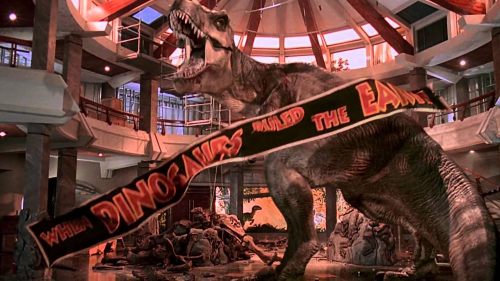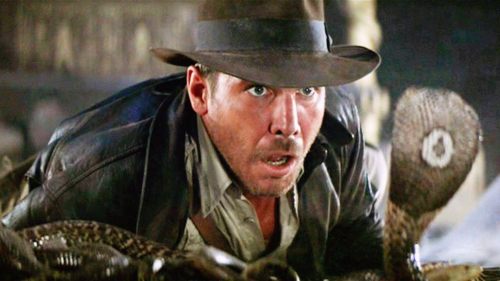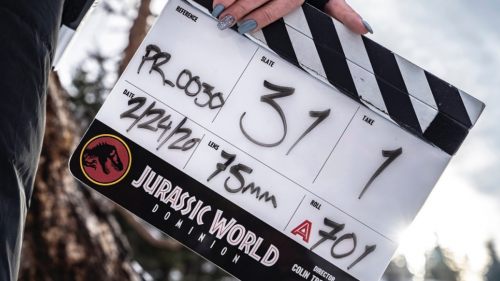The Strangely Cruel And Unusual Death In JURASSIC WORLD
This article is OBVIOUSLY full of spoilers for Jurassic World.
When dinosaurs and people meet the dinosaurs kill the people. This tradition stretches back to the very beginning of the history of cinema, and is solidified back in the silent era, in the original The Lost World. King Kong, way back in 1933, has some of my favorite scenes of dinosaurs chomping down on humans, made all the better by the fact that the dinos in question were herbivores (hey maybe millions of years of evolution changed things up for them). Dinosaurs killing people is a big part of the reason why we would even go see a movie like Jurassic World - if all the characters made it out the other side we would feel disappointed.
So why does the death of Zara - the British assistant to Bryce Dallas Howard’s Claire - feel so wrong? Why have so many people taken notice of the fact that Zara’s death is cruel and horrific? Why, in a movie predicated on the promise of dino destruction, does Zara’s end come across as deeply mean-spirited?
It’s because death has a cinematic language all its own, and Jurassic World doesn’t speak that language properly. Zara’s death rankles not because she didn’t deserve to die but because she didn’t deserve to die quite that hard.
How hard does she die? At the end of the film pteranodons attack the main mall/food court area of the park (weirdly the only time the conceit of the park being open and operational plays any role in the film at all) and begin going after tourists. One swoops in and grabs Zara, whisking her away from the young boys she’s supposed to protect. While in the air another pteranodon tries to grab her, there’s some back and forth, and she falls into the huge mosasaurus tank. She’s screaming this whole time, a deep and terrified scream that cuts right through you. In the tank she is pulled under by a pternadon a number of times, water filling her lungs, all in a shot that reminded me (likely purposefully) of the opening attack in Jaws. Eventually she is scooped up by a pteranodon, but the mosasaurus pops out of the water and chomps down on both Zara and the dinosaur holding her. This sequence probably takes just under a minute, but it feels like an eternity, with Zara’s screaming and gasping for breath adding a horrific element to it all. Also making the scene horrific: so much of it is played out in relative close-up; Zara isn’t snatched away and killed in the distance, we travel with her and we are in her personal space as she is tortured before being eaten.
I would say it’s the most horrible death in the movie. It’s well-executed (oddly this could be the only set piece in the movie that is structured in a way to actually give weight and meaning to the action within it) but that execution only adds to how deeply disturbing it is. It’s possible that this is the most horrible death in the entire franchise, or at least that it is running neck and neck with the death of Richard Schiff in The Lost World. It’s gruesome and it’s painful and it’s protracted.
But, like, it’s a dinosaur movie! That’s what should happen, right? Sort of. Here’s what’s important to understand - and what Jurassic World does not understand - the deaths of your characters must be proportional, unless the unproportional nature of the death is, in and of itself, the point.
There are a lot of reasons why a character might die in an action/adventure movie. They might be background fodder, and in that case it’s okay to destroy them in a longer shot and expect the audience to get a Grand Guignol thrill from it. There are plenty of moments like this in the pteranodon attack in Jurassic World, where random humans get assaulted and, we assume, killed by the flying dinosaurs in ways that are kind of funny or weird. Sometimes those deaths are called gags, to give you a sense of the allowable lightness in these kinds of deaths.
A character might die because they deserve it. That’s very common in an action/adventure film - think of Gennaro in the first Jurassic Park. His death is proportional and allowable because he panics and leaves Lex and Tim alone to face the T-Rex; this is an example of the most killable offense in a movie: selfishness in a survival situation. See also Burke in Aliens. Most often the character killed in these scenes brings about their own demise through their selfishness or cowardice. Evil characters also deserve it, and we find it truly satisfactory when they are destroyed - the bigger the bad guy, the more extravagant the death we want for them. Zara's death, for example, would have made a great death for Vincent D'Onofrio's Hoskins - there's a lizard center of our brain that wants to see our enemies suffer.
Sometimes a good character needs to die. Their deaths can be terrible, for sure, but there’s a proportionality at play here as well. A good character can suffer a horrible death when saving other characters, or they can suffer a horrible death that is intended to illustrate just how bad the bad guy/monster really is. Predator is a great example of this, where characters we like get absolutely slaughtered. The key to all of these deaths, though, is that we feel something on some level. These aren’t slasher movie deaths, where the kids are glorified examples of background fodder getting offed - you will feel sad that the character died or proud that they stood their ground. In some rare cases, like in war films, a good character may die randomly, without reason, but that’s actually to reinforce the cruel whims of fate that threaten our heroes. In movies even randomness has a point.
Death in a mainstream action/adventure movie is a moral equation, and it is absolute. You don’t have to think about it, it’s just obvious to anyone with a functioning understanding of storytelling and a basic sense of justice. Obviously these rules might be thrown out the window in some kind of experimental filmmaking or in the more oppressively bleak annals of hardcore horror, but for your general PG-13 family summer movie these rules are restrictive, and if a movie is going to break them they better do so with a good, strong reason.
So let’s get back to Zara. She’s not background fodder - she has a name, she has a job, we know a couple of things about her. Actress Katie McGrath even gives her a bit of a personality. What do we know about her? She doesn’t want to lead these two kids around all day, which seems fair to me - the movie’s HERO is also shirking this responsibility. If we’re trying to come up with reasons why Zara deserves what she gets this can’t be the answer.
She’s on the phone a lot. A woman on the phone… is this a code for something I’m not quite understanding? While on the phone we hear her say that she won’t let her fiancee have a bachelor party - she’s not fun! She’s maybe controlling. With her irritated, snobby attitude (briefly glimpsed) I am beginning to think that the film has put Zara into the character type of The Bitch.
This is good groundwork, but where does the movie pay that off? Is Zara cruel to someone? Does she ignore the boys for her own survival? She does ‘ignore’ them for a moment, when they’re at the triceratops petting zoo, but that is hardly a death penalty offense. After all, Claire has fobbed them off onto her assistant, who doesn’t seem like the type who would be great with kids.
Zara disappears from the movie except for one moment where, truly panicked, she tells Claire she can’t find the boys. Zara sounds, to me, actually upset by this. I guess we could assume she’s more worried about losing her job than losing the boys, but the movie offers absolutely nothing to allow us to judge this. The next time she’s in the movie she’s getting destroyed by dinosaurs.
There’s no question that Zara’s death is unearned as a comeuppance. She doesn’t deserve what she gets. But it also doesn’t work as a sad or instructive death - she’s not defending anyone, and the pteranodons are not even a real menace. They’re handled relatively quickly. In fact they’re such a non-menace that Claire defeats one that is attacking Chris Pratt's Owen, a heavily coded moment in a movie whose gender politics are, at best, weird.
Zara’s death serves only one purpose - it reminds us of the mosasaurus, which we already saw in action. It’s a moment where the movie nudges us in the ribs and says, ‘Hey, remember this dinosaur? Don’t forget him!’ in an insipid attempt to set up the bad finale where this dino mystifyingly saves the day (remember how the dinosaurs were animals in the first film?). What makes this especially problematic is that Zara's death recalls the opening attack of Jaws, which established the shark as a monster. The mosasaurus is a hero in this movie.
Her death could still serve the purpose of reminding us that the mosasaurus is out there without being so excruciating. It’s a profound miscalculation on the part of director Colin Trevorrow and his team of pre-viz artists to make this death so in your face. Zara is exactly the sort of character who dies in a movie like this (although my understanding is that she is NOT the sort of character who dies in a Jurassic Park movie - she’s the first on-screen female death in the series), and the generalities of her demise work. If we had watched from the POV of the kids as she was snatched by a pteranodon, flown away and then gulped down by the mosasaurus - from a distance - the scene would have worked in a big way; it would have had the distance required to make it a gag and it would have illustrated the extreme chaos that had befallen Jurassic World. But the camera travels with her, making her death not about how it impacts the kids (this is how Schiff’s death works in The Lost World - it’s an intensifier for other characters, not a comeuppance for him) but rather about how painful and lingering it is for her. It’s a horror movie kill, in other words. It’s deeply out of place.
Zara’s death feels like it was created without a concern for the larger meaning of the kill, or perhaps it was created at a point when the script actually gave Zara enough scenes to register as a character requiring a comeuppance. Either way, this death feels like a remnant of some pre-production, pre-visualization element of the movie that isn’t reflected onscreen. Either her death was built by someone who didn’t care about the basic storytelling needs a scene like this must serve or the film was edited by someone who didn’t understand that Zara needed more set-up to get annihilated in this way. As a result it’s a failure of a sequence that sticks in many viewers’ craws.
I think this scene may be Jurassic World’s version of the Battle of Metropolis in Man of Steel, a scene where some viewers react in a visceral way to a sequence that uses the wrong cinematic language while other viewers think those people are nuts/don’t understand that it’s all a movie, etc. Yes, it’s a movie, but movies speak to us in visual imagery, and the way that visual imagery is used is important. Fluency in that visual language is, frankly, the difference between a Steven Spielberg and a Colin Trevorrow.
Zara should have died. She just shouldn’t have died like that, and her death is the best example of the ways that Jurassic World simply does not work on a most basic cinematic level.



